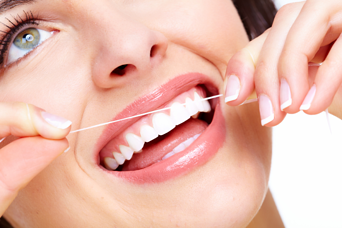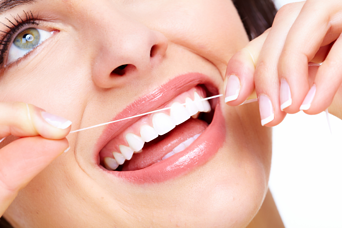Eight Things You Need to Know About Dental Floss


Although you know that you need to brush your teeth on a regular basis, you may think that flossing is merely an optional extra. However, it turns out that flossing is as indispensable as brushing, and it can improve your oral health in a range of significant ways. In addition, there are different forms of dental floss available, and there is a precise technique that will help you to make the most of whichever type you choose to buy.
If you avoid flossing, you only clean some surfaces of your teeth:
When you brush your teeth, you are only cleaning three of the five surfaces of your teeth. Flossing is the best way to clean between your teeth, as it is specifically designed to help you get rid of food residue and plaque.
Different types of floss suit different mouths:
Dental floss is usually made from either plastic or nylon, and it comes in waxed and un-waxed forms. Although current evidence suggests that waxed and un-waxed dental floss is equally good at cleaning your teeth, the alignment of your teeth may influence which type works best for you. More specifically, un-waxed floss can fit into smaller gaps, so if there are only very small spaces between your teeth then you may want to exclusively buy this type of floss. However, waxed forms of floss are marginally less likely to break during use, so if you have larger gaps between your teeth then you will probably find this type of floss more convenient.
Flossing has multiple health benefits:
Firstly, since flossing helps to remove bacteria, regularly using dental floss will make you less likely to develop gum disease, bad breath and cavities. Secondly, flossing helps to keep your smile looking its best by removing some of the debris that can make teeth look dull and grey.

Bleeding gums should not stop you from flossing:
People often abandon regular flossing once they notice that their gums are bleeding. However, it is actually very common for the gums to bleed when you begin flossing, because they can become tender as you remove the build-up of plaque. In light of this fact, it is important to keep flossing even if it causes slight bleeding at first. However, if this bleeding does not start to ease off within a week or so, you should discuss this problem with your dentist. It may be the case that you have particularly sensitive gums and need to buy a softer brand of floss.
There is a right way to floss:
Experts on dental hygiene caution that the way you floss is much more important than the type of floss you use. It is important to hold the floss taut so that it fits between your teeth, and you should move it up and down around eight times per gap. Many people make the mistake of rushing through flossing, only taking two seconds to floss each space between their teeth (which leaves the teeth much less clean). Each time you move onto a new gap, it is also vital to use a fresh section of floss. In addition, note that you can also boost your oral health by gently flossing under the gum line of each tooth.
You should floss on a daily basis:
Ideally, you should floss at least once a day. If you are only going to floss once, do so before you go to sleep, and make sure you do it before you brush your teeth. This will ensure that your toothpaste is more likely to reach the spaces between your teeth, making them even cleaner.
There are types of floss that can encourage children to keep their teeth clean:
Children are sometimes reluctant to floss, but some mint flavored forms of floss can help to make the experience less of a chore. There are also special flosses that change color in order to show how much plaque has been removed, and this might help younger users feel a sense of satisfaction when they clean their teeth.
There are ways to floss even if you have limited mobility:
If you suffer from arthritic hands or a wrist injury then you may find that flossing is extremely difficult. However, there are floss holders that are designed to help you work around such problems by providing dental floss attached to a handle that is easy to grip. In addition, an interdental brush may be a more suitable alternative to flossing in some cases. Although these are not always available in regular stores, you should be able to purchase one from your dentist’s office.


